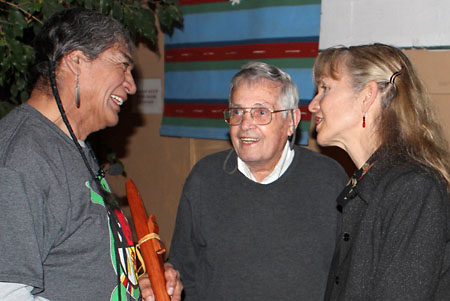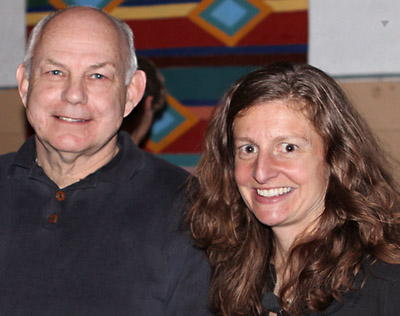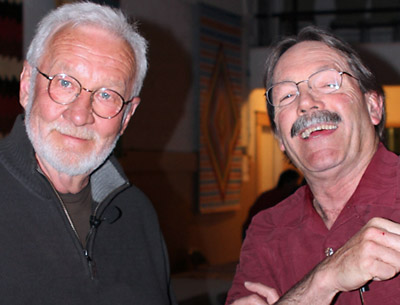|
Minds of the Methow
story and photos by Karen West
 Dayton Edmonds, left, James Donaldson and Maggie Coon, were among Saturday night’s speakers. Edmonds shared stories from the oral tradition of Native Americans; Donaldson and Coon questioned each other on the subject of a future land ethic for the Methow Valley.
The Methow Valley Community Center hosted at least 300 people last weekend for what could become an annual event called Methow Minds. In the process, the non-profit center, which is celebrating its 100th birthday this year, will add about $2,000 to its coffers after expenses.
"We didn't do it for the money," a pleased Kirsten Ostlie, MVCC manager, said Monday. "The main reason was community building, which is priceless." She credited all the volunteers who made Methow Minds happen and especially the center's board of directors, who volunteered without complaint for two nights. Terry Hunt, probably best known for his contributions to local music culture, had the idea of organizing an event at which local people would be given 15 minutes to talk about a subject of their choice.
He was inspired by the TED conferences, which started in 1984 to bring together thinkers and doers from the fields of technology, entertainment and design. The TED participants were given 18 minutes or less to “give the talk of their lives,” according to the organization’s web site. That concept has grown to include global conferences and programs that continue the founder’s goal, which was “to foster the spread of great ideas.”
Hunt introduced the local program Friday by telling the audience, “Tonight’s event comes out of a growing interest I have in listening to other people’s stories.” In pursuing that interest, Hunt, who also is a videographer, has been filming local events and stories. He said he will post highlights of Methow Minds on his internet site www.methowtv.com later this week and next.
Here are excerpts from both nights of Methow Minds in the order the speakers appeared.
Jim Kistner
Kistner, a lifelong educator who will turn 70 in February, decided to share some thoughts on aging in a talk titled, “Even Odysseus Grew Old.” Drawing on Greek mythology, the writings of psychologists and the poetry of Yeats and Mary Oliver, among other sources, Kistner said, “I believe great literature has meaning in our lives.”
He discussed “the opportunity we have as we age to go deeper inside our lives” as opposed to our youth, when we are developing our ego and differentiating ourselves from others. Alluding to Odysseus turning from the sea to the land, he concluded by saying, “I wish each of you, especially the old people in this room, good fortune as you travel your own path inland.” And he called the sharing of stories from that journey “a role old people have always played in this community.”
Sarah Brooks
Brooks, associate director of the Methow Conservancy, shared her passion for philanthropy. She made the case for giving money and time to others in a four-point presentation on the power of giving, asking others to support causes we care about, recognizing the gifts we receive from others, and the need to teach our children about philanthropy.
Americans are the most generous people in the world in terms of personal giving, Brooks said. Last year, they gave $300 billion and 65 million adults volunteered their time. But, she added, those billions of dollars are just two percent of our gross national product, and the volunteers are only 25 percent of the population. “We need a movement to inspire giving,” she said. “Our own souls need to give.” To illustrate her point about recognizing the gifts we receive from others, she talked about Bill Gates, who received computer access because a cadre of PTA volunteers solicited donations to buy a super-computer for the school he attended. “You can get through this life without giving, but you can’t get through life without receiving,” Brooks said.
 Glenn Schmekel and Sarah Brooks were among the eight speakers on the first night of the Methow Minds program. Schmekel’s theme was getting to know our neighbors in need; Brooks shared her passion for philanthropy.
Glenn Schmekel
Schmekel, founder and director of the The Cove and other programs under its umbrella, described starting the food bank 14 years ago this month in the same space it occupies today, although now more than 20 volunteers are participating. From the beginning the idea was “getting to know your neighbors in need,” Schmekel said, and to create an informal atmosphere where people could sit and talk and receive help with needs beyond groceries.
Schmekel said 10 to 15 percent of our local population needs help, and that given the state of government-funded social service programs today, each of us needs to apply our “capacity to help” build a better world.
Patrick Hannigan
Hannigan, a former producer for MSNBC who writes the Twispted Reality column for the Methow Valley News, titled his lecture, “Cervantes to Colbert: Satire as a Voice for Change.” He used his 15 minutes to share the history, and define types of satire. The satirist uses irony, parody and exaggeration to make a point, he explained, illustrating by citing examples from Swift's "A Modest Proposal" to today’s television shows such as “The Simpsons” and the “Colbert Report.”
Hannigan said, “I think of satire as a carnival mirror and it reflects back our own flawed humanity.”
Jon Hawley
Hawley, who came to the Methow Valley in the 1970s, is a world traveler who spends considerable time in South India and Sri Lanka. Hawley chose to take his audience on an entertaining tour called “Signs and Wonders: An Okanogan County Pilgrimage.” Using photographs of roadside historical signs to illustrate, Hawley read aloud the colorful language used to describe the history of Ruby, Silver, the China Ditch, the Hee Hee Stone and other county places he urged the audience to explore.
Bill Hottell
Hottell, lifelong educator and world traveler, posed the question, “Is America Repeating History?” He compared the history of the Roman Republic, which lasted more than 500 years, to the history of the American Republic, which is now more than 200 years old. Both were born of revolt, he said. Both threw off kings, both created a form of government that gave voice to the people.
The Roman Republic ended with one-man rule, Hottell said, adding that the emperor “Augustus was clever enough to keep the illusion of the Roman Republic.” The trappings were there, but they were like the set for a play, he said.
He then asked, “Is America changing from a democracy into a corporatocracy?” Citing the U.S. Supreme Court’s decision in the Citizens United case, which granted personhood to corporations, Hottell said corporations are “persons” with no feelings and no soul, but they have billions of dollars. “Who holds the real power in the American democracy, the corporations or we the people? ... Does America now have the best government money can buy? What do you think?”
 Jim Kistner, left, the opening speaker at Methow Minds, shares a light moment with Jon Hawley. Kistner shared thoughts on aging; Hawley entertained the audience with a slide show and reading of historical signs found along the road in Okanogan County.
Jane Pappidas
Pappidas, a professional actor for many years, described her love of live theater, which started in the second grade when she couldn’t remember the single line she was supposed to speak in a school play. Her next role, she said, was the non-speaking part of Dopey in “Snow White and the Seven Dwarves.” But from such humble beginnings, Pappidas went on to leading roles in many plays, including the works of Shakespeare. She captured her Methow Minds’ audience with a riveting reading from Shakespeare as well as an excerpt from a speech by Sir Lawrence Olivier to the British House of Commons.
“We pursue what we love,” Pappidas said, cautioning that “Passion burns out. Love burns with a steady flame... In this small valley we can all pursue what we love.”
Mark Wenzel
Wenzel, superintendent of public schools, talked about education “Moving Toward Creativity and Passion.” Educators today have the advantage of knowing what’s been learned from recent brain research, Wenzel said. For example, we now know “There are lots of intelligences. Kids can be smart in lots of ways.” We also know “Creativity can be learned,” he said. And the way to teach creativity is by “asking great questions.” We know that “Risk-taking is a big part of creativity” and that “You need base knowledge to be creative,” which is where creative teachers are important. He also stressed the need to recognize that creativity applies to all fields, not just the arts.
Dana Visalli
Visalli, a botanist, educator and political activist, saw his challenge as covering “15 billion years in 15 minutes.” Visalli quoted Carl Sagan as saying, “We humans are like a newborn baby left on a doorstep” without any knowledge of our heritage.
At one time “all the galaxies were in the same place – billions of galaxies occupying a place the size of a pinhead,” he said. The oxygen essential to our lives was first formed in the stars, he noted. Moving into politics, he called the war in Vietnam “not just genocide but ecocide” for its damage to the environment. “One bomb will do more damage than the good you can do in your entire life” so the question is,“What are you going to do about it?”
Adrianne Moore
Moore, a social worker at Room One, chose the topic “Having Faith.” Describing the popular cultural obsession with “finding balance” in one’s life, Moore said, “We talk about balance and harmony as if they were an end... To attain harmony you have to believe in something.”
Saying that her 20-year-old brother is about to become the sixth generation of ministers in her family, the fifth of which included her mother, Moore also talked about her father, whose religion is Marxism. Both parents followed religions containing “fact and fiction,” she said, adding, “What if faith meant simply a life lived in service to others?” Moore ended by quoting her mother, “Faith should never blind you. It should crack you open to the world.”
Maggie Coon and James Donaldson
Coon and Donaldson had a conversation about a future land ethic for the Methow. Coon has worked in state, national and international land conservation. Donaldson is a psychotherapist and consultant to The World Council of Churches. Both were active in the Methow Valley Citizens Council, which fought development of a downhill ski area in the upper valley.
Donaldson asked, “What does a land ethic mean to you?” Coon said after reflecting on the work of Aldo Leopold, she concluded that “It’s like the Golden Rule extended to our land, our plants and animals.” She added,“The first law of intelligent tinkering is to save all the parts.”
Speaking of people who taught them about the parts, Donaldson credited the late Deke Smith with teaching him a reverence for the land. Coon credited her neighbor Pat Christiansen with teaching her how to do things, and she called the late Ron McLean the valley’s poet laureate. “He was so connected with this land.”
Coon suggested what’s needed is a political framework for caring for this valley. We need to consider creating a "Methow County,” she said. Added Donaldson, “This is not five-acre minimums in the north and one-acre minimums in the south. This is one biotic community.”
Donna Keyser
Keyser, an artist and the artistic director of the Confluence Gallery, titled her talk, “I Traffic in Beauty” and said “We have a visceral, emotional, addictive desire to surround ourselves with beauty.” She showed slides of her work and explained her personal creative process. “There is power in art that is beyond logic.”
And alluding to the Methow Valley, Keyser said, “Maybe our greatest resource here is creativity.”
Richard Hart
Hart, an historian, expert witness in Native American treaty rights cases and prolific writer, described the amazing endurance of the Zuni, one of the first tribes for which he worked. He shared what he sees as lessons from the Zuni for “holding a community together through thick and thin.”
The Zuni were most often described by early whites who reached their village as “hospitable” and “industrious,” Hart said. They have a complex society and their tradition is that no one should go hungry or be lonely. “Violence, particularly corporal punishment for children, is strictly taboo.” Men and women are viewed as equals and bigotry is not tolerated. Zuni history is passed to the next generation through a detailed oral tradition.
The people in the Methow Valley also are “hospitable” and “industrious,” Hart said. And like the Zuni we have a complex society. He cited numerous local organizations meeting social needs, working to preserve farmland and support local farmers, educating our children, promoting the arts and preserving local history.
Hart concluded by saying: “It’s up to us to sustain this great community, while trying as best we can to be industrious, hospitable, decent and civil – let me add generous. We can’t rely on anyone else, and who knows how great will be the implications of our success?”
Betsy Devin Smith
Smith, local veterinarian, rancher and biathlon coach, described “The Changing Face of Methow Agriculture.” From personal experience, she related the change from larger operations to small farms. “I’ve always had a desire and even a need to work with the land and animals,” she said. She grew up in the upper valley dreaming of restoring an old homestead and running a large cow-calf operation.
However, as she and her husband Skip discovered, the financial realities of life meant a large cattle operation “just didn’t pencil out.” Today, said Smith, she thinks the Methow is “a great place to be a small farmer” but “agriculture has to be supplemented by other income.” She continues to work as a vet and her husband as a welder in addition to raising sheep and selling lamb meat and blankets directly to the consumer.
“I dream of the valley being more and more self-sufficient,” she said. “As a family we love to sit down to a meal and say we raised everything on that plate except the salt.”
Dayton Edmonds
Edmonds, a Native American of the Caddo nation who has worked with youth in Okanogan County for decades, concluded the Methow Minds event by presenting the “Oral Tradition of the First Nation.” In a mesmerizing presentation, Edmonds told two stories, one passed down by his grandparents to explain why he had to start each day by singing a song. The other, accompanied by playing his wooden flute, told the story of a boy too shy to speak to anyone except the wind. And he told of how the wind gave the boy the gift of the flute so he could speak to the girl he loved.
“Let’s remember who we are and what we are,” Edmonds said, by passing our stories on to “our children and our children’s children.”
4/17/2012
|

 Dayton Edmonds, left, James Donaldson and Maggie Coon, were among Saturday night’s speakers. Edmonds shared stories from the oral tradition of Native Americans; Donaldson and Coon questioned each other on the subject of a future land ethic for the Methow Valley.
Dayton Edmonds, left, James Donaldson and Maggie Coon, were among Saturday night’s speakers. Edmonds shared stories from the oral tradition of Native Americans; Donaldson and Coon questioned each other on the subject of a future land ethic for the Methow Valley.
 Glenn Schmekel and Sarah Brooks were among the eight speakers on the first night of the Methow Minds program. Schmekel’s theme was getting to know our neighbors in need; Brooks shared her passion for philanthropy.
Glenn Schmekel and Sarah Brooks were among the eight speakers on the first night of the Methow Minds program. Schmekel’s theme was getting to know our neighbors in need; Brooks shared her passion for philanthropy.
 Jim Kistner, left, the opening speaker at Methow Minds, shares a light moment with Jon Hawley. Kistner shared thoughts on aging; Hawley entertained the audience with a slide show and reading of historical signs found along the road in Okanogan County.
Jim Kistner, left, the opening speaker at Methow Minds, shares a light moment with Jon Hawley. Kistner shared thoughts on aging; Hawley entertained the audience with a slide show and reading of historical signs found along the road in Okanogan County.